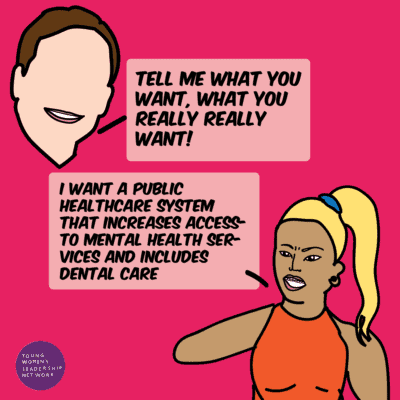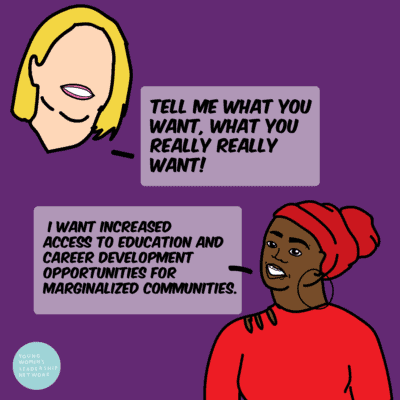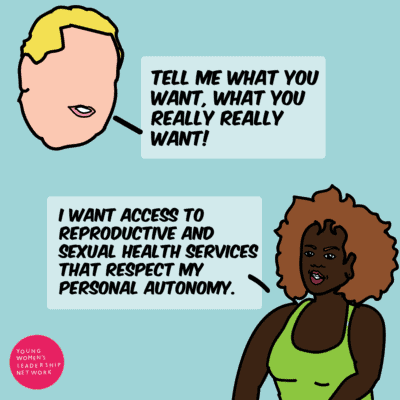Leading up to the Provincial Election on June 7 (PSA: VOTE!), the Young Women’s Leadership Network (YWLN) held a series of roundtable discussions with community members to tackle young women’s issues and policy priorities. We can exercise our power in this election, but we have to be informed, and we have to take action. Most importantly, we have to VOTE.
We asked YWLN’s Executive Director Arezoo Najibzadeh what she gleaned from those discussions, and what is important to keep in mind when casting your ballot.
SDTC: What were you hearing from young women about the changes they wish to see in Ontario?
AN: Young women across the province are concerned about a variety of issues that all lead to the province’s need for prosperous and inclusive communities that work for diverse populations. From housing to transportation to leadership, young women recognize the need for holistic approaches to addressing the issues facing our province.
What issues were high on their list of priorities?
Access to leadership and advanced education and building thriving communities are high on the list of young women’s priorities in this election. A lot of young professional women and recent grads are concerned with the current state of women in leadership in both the public and the private sectors. The recent changes to OSAP do not necessarily provide tangible supports for part-time and continuing education students and that proves to be yet another barrier to young women’s professional advancement within large institutions.
A lot of the conversations on housing, transit and environment, for example, centre our need for connected and prosperous communities that tackle issues such as poverty and climate change head-on. In our latest discussion, we talked a lot about rent control, tenants rights and bikeable cities.

What do they think is working now? What isn’t working?
We want proactive measures that address the root causes of inequity instead of band-aid solutions that often follow media outbreaks or years of advocacy on behalf of citizens.
The School Resource Officer (SRO) program has been something that’s come up in a few discussions and our participants have reminded us that Black activists and community leaders have been calling for an end to that program for years, but it took even more advocacy and hard work from BLMTO for politicians to even recognize the problem not only on a local level but provincially as well.
The same thing can be said about the gender-based violence strategy; we don’t need movements like #WeBelieveSurvivors or #MeToo to start listening to survivors and advocates and engaging them in decision-making processes that impact their lives.
What prompted the young women you met with to get involved in the political sphere?
A lot of the young women and trans folks who join our events have been traditionally excluded from the decision-making process, but there are also Indigenous women who choose not engage with colonial governance systems. So it’s on our leaders and community organizers to redefine civic or community engagement to make space for all leaders and their demands. A lack of engagement doesn’t always stem from misinformation; it sometimes has to do with the very nature of our conversations.

What are they excited about with this coming election? What are they worried about?
We’re excited to see so many amazing young women and community leaders as candidates. Saman Tabasinejad in Willowdale, Naheed Yaqubian in Aurora-Oak Ridges-Richmond Hill, Jill Andrew in Toronto-St. Paul’s, Cherri Wong in Ottawa Centre and Lyra Evans in Ottawa-Vanier are a few folks who have shown immense dedication to empowering young women throughout their work.

We’re concerned about some of the progress that’s been made in the past few years; especially when it comes to sex education and support for survivors of sexual and domestic violence. The new sex education curriculum is fundamental to consent education and aims to help students make informed and healthy decisions about their identities and interactions and we can’t afford to loose that.
The investment in support for survivors of sexual or domestic violence are brought up in our conversations as well; we now have up to ten days of sexual or domestic violence-related leave (five days of which are paid), a pilot program that offers up to four hours of free legal advice to survivors of sexual violence, and investments in the expansion of transitional housing and access to counselling.
We can’t afford to go back on any of these promises. I know a lot of them don’t go far enough, so we should choose a government that will add on and improve these resources instead of roll back on them.




 Follow Us On Instagram
Follow Us On Instagram
